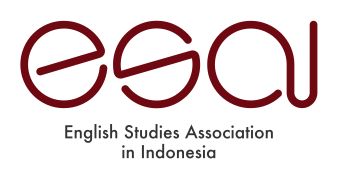UTILIZING BRAINLY AS A SOCIAL QUESTION-AND-ANSWER (Q&A) SERVICE IN ENGLISH LEARNING MATERIALS: BENEFITS AND LIMITATIONS
Abstract
This study describes Brainly as a social question-and-answer (Q&A) service in English learning and finds the positive and negative impacts on teachers and students. This research is descriptive qualitative. The analysis shows that using Brainly is easy. We can open Brainly at https://Brainly.co.id/. If we do not have an account, we can register using Gmail, then log in using the Brainly account. To make a question, click "Let's Ask", write down the questions, select the points to be rewarded to the answerers, choose the type of subject matter then click "Ask a Question". To answer a question, click the question to be answered in the "our answer" column fill in the answer, and click "Add Answer". Answering questions will add to our points. Based on previous studies, using Brainly have a positive and negative impact. Positively, teachers can convey concepts to their students simply and ability to connect students with education experts. Besides, students can add insight into knowledge which affects students' learning interests and learning outcomes. They can get answers and references and interact with each other to add answers or can be mutually correct. Brainly can provide easy content and is easily accessible to the student, this site is more practical compared to other educational sites, facilitate students in doing homework, can be used as an alternative to communicate virtually, and can be a learning resource and motivation simultaneously. Negatively, using Brainly creates students’ laziness to read books, reduces effectiveness in learning activities, generates dependency on Q&A technology, and familiarizes students to be passive to get an answer instantly. It impacts the teacher’s inability to control the students who used books or websites. However, further research certainly still needs to be done related to the level of accuracy of the answers given to the answerers on Brainly.
Full Text:
PDFReferences
Anggito, A., & Setiawan, J. (2018). Metodologi penelitian kualitatif. CV Jejak (Jejak Publisher).
Anggraini, R., Wahyuningtyas, N., & Ruja, I. N. (2021). Analisis Pemanfaatan Search Engine Sebagai Sumber Belajar Peserta Didik Dalam Memahami Materi IPS. Edutainment, 9(2), 74–82. https://doi.org/10.35438/e.v9i2.462
Anis, M., Chawky, S., & Halim, A. A. (2022). Mapping Innovation: The Discipline of Building Opportunity across Value Chains. Springer Nature.
Cahyo, P. W., Kusumaningtyas, K., & Aesyi, U. S. (2021). A User Recommendation Model for Answering Questions on Brainly Platform. Jurnal INFOTEL, 13(1), Article 1. https://doi.org/10.20895/infotel.v13i1.548
Cahyo, P. W., & Sudarmana, L. (2022). Klasterisasi Penjawab Berdasar Kualitas Jawaban pada Platform Brainly Menggunakan K-Means. Jurnal Sisfokom (Sistem Informasi dan Komputer), 11(2), Article 2. https://doi.org/10.32736/sisfokom.v11i2.1314
Choi, E., Muñoz, R., Mukhlas, D., Balak, M., Farias, L., Jara, D., Turnip, P., & Burkov, O. (2016). Understanding user motivations for asking and answering a question on Brainly, online social learning network. Undefined. https://www.semanticscholar.org/paper/Understanding-user-motivations-for-asking-and-a-on-Choi-Mu%C3%B1oz/2d2653fc86611747cb304a9662601cf7b1b5d7fb
Cvetković, D. (2019). Interactive Multimedia: Multimedia Production and Digital Storytelling. BoD – Books on Demand.
Dhaya, & Kanthavel. (2022). Computer-Assisted Learning for Engaging Varying Aptitudes: From Theory to Practice: From Theory to Practice. IGI Global.
Garg, V., & Agrawal, R. (2020). Transforming Management Using Artificial Intelligence Techniques. CRC Press.
José, D.-A., Emilio. (2020). ICTs and Innovation for Didactics of Social Sciences. IGI Global.
Murtiyasa, B., Aulida, A. N., & Abdullah, M. A. A. bin. (2021). Analisis efektivitas Brainly sebagai platform e-learning untuk meningkatkan minat belajar siswa SMA. Pythagoras: Jurnal Matematika Dan Pendidikan Matematika, 16(2), Article 2. https://doi.org/10.21831/pythagoras.v16i2.44875
Nugroho, R. A. (2021). Pengaruh Penggunaan Brainly Terhadap Hasil Belajar Siswa. Epistema, 2(2), Article 2. https://doi.org/10.21831/ep.v2i2.41370
Qolbi, L. F. A. (2021). Penggunaan Aplikasi Brainly dalam Meningkatkan Pemahaman Siswa dalam Proses Pembelajaran. Matriks : Jurnal Sosial Dan Sains, 2(2), Article 2. https://doi.org/10.36418/matriks.v2i2.62
Ramadhani, S., & Pulungan, A. S. S. (2020). Analisis Pemanfaatan Brainly Sebagai Sumber Belajar Online Pada Materi Sistem Koordinasi. 190–193. http://digilib.unimed.ac.id/43882/
Ridwan, F. R. (2021a). Aplikasi Brainly Sebagai Alternatif Berdiskusi, Bersosialisasi, dan Berprestasi di Masa Pandemi. Sintesa: Jurnal Ilmu Pendidikan, 16(1), Article 1. https://www.sintesa.stkip-arrahmaniyah.ac.id/index.php/sintesa/article/view/27
Ridwan, F. R. (2021b). Aplikasi Brainly Sebagai Alternatif Berdiskusi, Bersosialisasi, dan Berprestasi di Masa Pandemi. Sintesa: Jurnal Ilmu Pendidikan, 16(1), Article 1. https://sintesa.stkip-arrahmaniyah.ac.id/index.php/sintesa/article/view/27
Rif’ati, R., & Sugiyono, S. (2020, February 5). Teacher Supervision of Students in Using Brainly.co.id Website as a Learning Facility. Proceedings of the 2nd International Conference on Education, ICE 2019, 27-28 September 2019, Universitas Muhammadiyah Purworejo, Indonesia. https://eudl.eu/doi/10.4108/eai.28-9-2019.2291011
Sari, M., & Asmendri, A. (2020). Penelitian Kepustakaan (Library Research) dalam Penelitian Pendidikan IPA. Natural Science: Jurnal Penelitian Bidang IPA dan Pendidikan IPA, 6(1), Article 1. https://doi.org/10.15548/nsc.v6i1.1555
Shivani, V., & Pradeep, T. (2020). Impact of AI Technologies on Teaching, Learning, and Research in Higher Education. IGI Global.
Sinaga, N. N. (2022). Pengaruh Pemanfaatan Brainly Sebagai Sumber Belajar dan Motivasi Belajar Terhadap Prestasi Belajar Ekonomi Siswa Kelas XII IPS SMAN 1 Pegajahan Tahun Ajaran 2022/2023 [Undergraduate Paper, Universitas HKBP Nommensen Medan]. http://repository.uhn.ac.id/handle/123456789/7381
Srinivasa, K. G., Kurni, M., & Saritha, K. (2022). Learning, Teaching, and Assessment Methods for Contemporary Learners: Pedagogy for the Digital Generation. Springer Nature.
DOI: http://dx.doi.org/10.30813/jelc.v14i1.4163
Refbacks
- There are currently no refbacks.



2.jpg)



